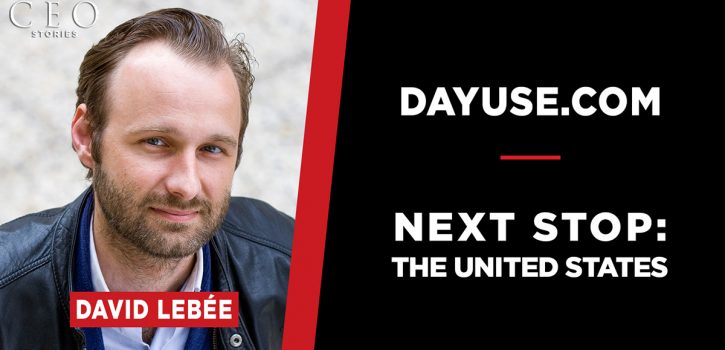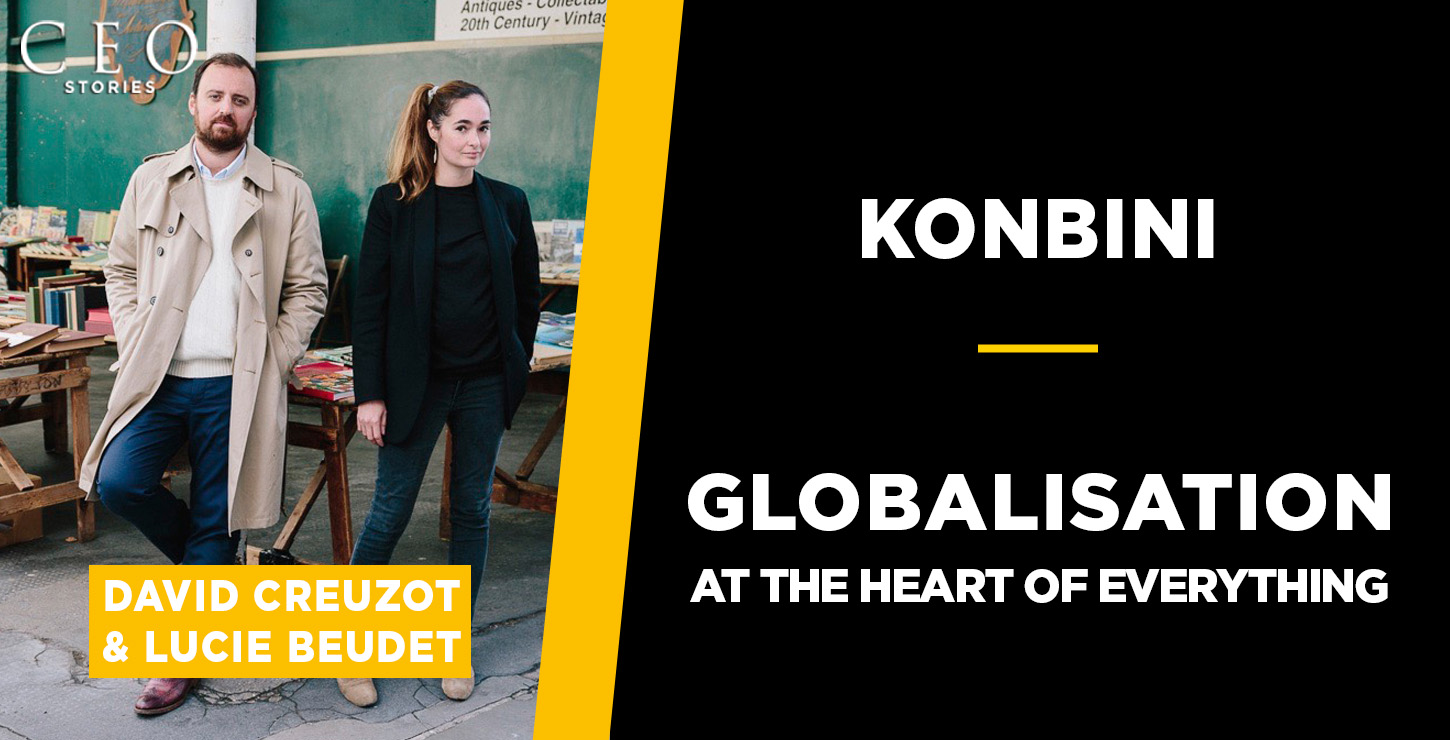Dayuse.com: next stop, the United States
Dayuse.com is the world’s number one daytime hotel booking agent. The startup is opening up digital opportunities for a market that was previously invisible: daytime hotel room booking for several hours, with reduced pricing.
is the world’s number one daytime hotel booking agent. The startup is opening up digital opportunities for a market that was previously invisible: daytime hotel room booking for several hours, with reduced pricing.

Just like his concept, Dayuse.com founder David Lebée is an atypical entrepreneur. During his tenure as General Manager of Hôtel Amour in Paris, he decided to make the 70% of unoccupied rooms in the hotel available for daytime booking. After a first record-breaking round of funding that reached 15 million euros in 2016, and the opening of offices in the United States and Brazil, TextMaster caught up with David for a chat about his experience in the United States , where he plans to reach 50% of total revenue within 3 years.
Currently, 55% of Dayuse.com revenue comes from abroad. What are your goals?
We currently have 150,000 users and 4,000 partner hotels in 20 countries. In 2016, we generated 20 million euros in sales, more than half of which was abroad.
The United Kingdom is our second largest market after France. Each year, our growth there is 150%. The United States is currently our third market, followed by Italy.
Our international strategy is a priority for Dayuse.com. We plan to operate in 30 new countries in the next 3 years. By 2020 our goal is to reach 2 million users and 500 million euros in sales, 90% of which would be abroad, and half of that would come from the United States.

How did you select your target markets?
Europe is our core market, the one we started in. Outside of Europe, our 3 main target markets are North America, South America and Asia. We are currently focusing on the American continent and plan on operating in Asia in 2017.
We focus on cities, and mostly capitals, more than actual countries. This comes from experience: when we started out in France, we were in many cities and ended up realizing that 90% of our sales came from Paris.
For example, we target Frankfurt, Berlin, Munich and Cologne in Germany, and Madrid and Barcelona in Spain.
As for the United States, we are developing the country’s 5 largest cities and will operate in 10 secondary cities later on. We won’t go any further. Launching in every city doesn’t make any sense to us.
To determine our target cities, we focus on a number of criteria. One of them is the population (the city must have over 1.5 million inhabitants), how many companies and headquarters are present (the city must be a business hub), the country’s GDP, etc.
Did you set your sights on the world from the start?
We knew that we were pioneers on the market: the concept wasn’t anywhere else. Entering foreign markets was a quick decision because the concept behind Dayuse.com is adapted to so many types of users and situations.
In France, for example, we were focused on “couples”, and noticed traction with travelers and business travelers. We now focus on these three targets and adapt our communication based on where we are.
We began our international development a year after Dayuse.com was launched. We started out with a test in London, before accelerating our development in other markets.

What is your communication strategy like abroad?
Our success relies on the fact that we offer a new type of service that meets needs that have been there forever. We turned something that was done on a case-by-case level into a streamlined process, that is both simple and discreet.
Given our limited resources (4,000€ was our initial investment), we had absolutely no communication budget when we started. Our main advantage was a unique value proposition that was fun too, and quickly garnered media attention.
Word of mouth took care of the rest and is still one of our main communication drivers.
Abroad, we used what worked in France, while applying a precise strategy:
- A structured offer: we begin with an exploration phase and partner with hotels in one city. This can last a few months.
- Adwords campaign launch : after reaching 30 hotels per city.
- Start with PR : after we sign on 50-60 hotels per city, we work with local agencies, supervised by our communication team in Paris.
- Media investments : once we reach 100 hotels per city, we invest online and offline, in display, RTB, retargeting as well as billboards, radio and printed media.
You launched in the United States last year. Did this market involve any specific efforts?
Entering the American market isn’t an overnight thing. It means putting in a lot of time and resources to find the right partners (lawyers, accountants, etc). Costs are high, but so is the market potential.
The American market is our number 1 priority : we believe that if we can succeed there, we can become worldwide leaders in our field. We opened a local subsidiary, a necessity to grow within the United States, which is based in New York. This was a must-do for two reasons:
- From a practical point of view : our activity implies that we develop a close relationship with hoteliers. We need to meet with them, visit their hotels, etc.
- From a cultural point of view : Americans tend not to care about a company if it isn’t physically present in the country.

Did you face any challenges in your launch on the American market?
Yes. We even made some mistakes when we first arrived. We started out with a French-American team and worked with some American team members that didn’t live up to our standards.
We also made the mistake of starting out in Miami for fiscal reasons and to get closer to the Latin-American market. It turned out not to be such a great idea.
We quickly corrected our mistakes:
- We moved our offices to New York : the city is our main market for the United States. In 2015, we had 1 million dollars in sales there. It is also the main hub for the East Coast.
- We also changed our recruitment strategy to work with expert American sales representatives, who have a good rapport with hoteliers.
- We sent over our UK country manager, who was a good cultural fit and helped introduce our company culture and best practices.

How are recruiting and management different in the United States?
Recruiting American team members is complex and costly : sales salaries are 4 to 6 times higher than in France. We had to adapt to New York-level prices. It is a hefty investment, but these are profiles that open doors to useful networks.
We also see major cultural differences in salary negotiations : Americans, at least in sales, can be a little vindictive. They are, first and foremost, dedicated to their salary.
Management however is much closer to what we do in Europe since we are a startup. Our management style is direct, with very little hierarchy.
I think it’s important for the CEO to maintain a constant relationship with the US teams. I personally go there very often, even if I’m not planning on settling there for now.

Is your American office a representative office or more?
That is what we thought for a long time. We also believed that we could manage other departments from Paris. We then realized that certain American skills are key, especially when it comes to the product and marketing.
That’s why we are currently hiring industrial psychology experts in the United States for our website. We are also going to set up a local marketing team to manage traffic acquisition, affiliation and local partnerships.
Additionally, we are thinking about going local with our customer service, but not necessarily in New York for cost and hiring reasons. Dallas appears to be a good option, many hospitality customer service providers are already set up there.
I believe that we will probably end up duplicating most Dayuse.com departments in the United States.
Were you inspired by a specific model for your international development?
I am pretty impressed by Booking. I started as an intern in hospitality 15 years ago, and Expedia was the undisputed leader. In under 10 years, Booking took Expedia’s spot.
I feel inspired by the way Booking was launched and how it developed on an international level.
Their sometimes dominant strategy isn’t necessarily a model for me, but I do believe it is a great example of lightning-speed development.

What advice would you give other entrepreneurs on international expansion?
When something works and doesn’t exist in other countries, you need to hurry and get there. Wait as little as possible, so local competitors can’t take your spot.
Regarding the United States specifically, you need to keep in mind that it is very costly. It’s better to go all in, with enough resources, than step by step. The US market has a lot of opportunity but it is also very complex, you can’t simply dip your toe in.
Many thanks to David Lebée for sharing a behind the scenes look into Dayuse.com’s American adventure.







